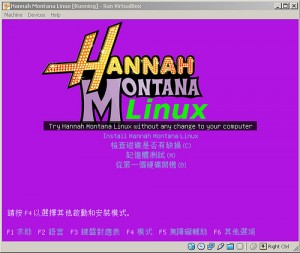kw704 : Elementary OS and Thor Squared.
Nov 17Its time to dive back into the audio podcasting after your Double Topping of F.A.C.T.S. video coverage last week. This week we grill wiseguy Thor about his experiences with Elementary Linux, a Distro spin on good old Ubuntu 12.04 with stunning looks and a soft spot for the hardware impaired. Afterwards we give you a last echo of the F.A.C.T.S. event with an interview we did with the people of Brainfreeze about one of Belgium’s most popular Manga & Anime websites and talk a little about Thor and why it is I am unable to lift Thor’s hammer. We did have a little issue with the audio quality in the intro and outro of the show, so we hope you forgive us for this little blunder, it will all be fine next time .. We promise.
Shownotes.
- Elementary OS
- Brainfreeze.be
- Our coverage of F.A.C.T.S. (part 1 and part 2)
- The “Behind the scenes” on how we recorded this show (see if you can spot the mistake we made while recording the intro)
Related Posts
Point the Way Home: DDNS with Linode
Aug 02Guest Blogger: Keith Murray
Earlier this year I switched my web hosting from my long-time account at DreamHost to a fancy new VPS at Linode. I really did enjoy my time with DreamHost, but what I wanted out of my hosting provider had changed somewhat. I was looking for full control of a machine in the cloud. Although DreamHost does offer a VPS option, the pricing options just didn’t compare with what Linode was offering.
I also took the opportunity to move my domain registrations over to Hover, but more on that another time.
With my Linode account managing the DNS for my domains I was able to point a a single subdomain back at the IP of my home network, effectively giving me a nice publicly accessible domain from within my network. This worked well until my ISP changed the IP address I had. Admittedly this doesn’t happen often, but it always seems to occur when I actually need to make use of this remote connection, and with no knowledge of my new public DHCP address it’s pretty useless.
Enter DDNS.
With some modifications to a script I found on GitHub I was able to quckly set up job to check my public IP address and update the DNS records at Linode using the Linode API. I hacked apart the original script and put together my own DDNS update script, suitable for automating.
By scheduling the script to run using a simple crontab entry I can rest assured that every night, while I’m asleep, my server will be connecting to Linode to point the way home.
Keith Murray is a software architect and developer who blogs about technology and science at kdmurray.net. He can also be found on twitter as kdmurray.
Related Posts
kw602 : Life on a Stick.
May 16Do you have any USB Thumbdrives lying around collecting dust or data that you haven’t used in quite a while ? Those days are gone after you listen to this weeks episode of the Knightwise.com podcast. We show you how to “live of a stick” and have both your data, your applications and even your complete operating system .. running on a stick.
Shownotes
- Different kinds of drives
- Portable Apps
- Clonezilla
- System Rescue Cd
- Gparted
- Spinrite
- Backtrack & Orphcrack (not mentioned in the show)
- Unetbootin
- Pendrivelinux
- MultisystemOS
- Truecrypt
- Install Linux on an encrypted drive
Related Posts
What if we took Linux seriously ?
May 12It had only been a couple of days since the release of the latest version of Ubuntu’s next incarnation 13.04 when I decided it would be time to give it a spin on my Lenovo Thinkpad. I had only purchased the little 11.6 inch I3 laptop a couple of days earlier ( A nice second hand machine if I may say so ) and was planning on using it for most of my day-to-day computing tasks. Having read up on all the ‘latest’ features to come to 13.04 I was looking forward to the next version of Nautilus and having a peek at the new “Friends” application that had come to replace Gwibber. But most of all I was looking forward to the speed increase in Unity.
Four hours later I woke from a daze of searching forums, entering command line strings, downloading packages, fixing dependencies and filing bugs to a system that was actually working. As it turned out the “bleeding edge” of Ubuntu Distro’s had been hemorrhaging into my work schedule where it had eaten up the precious time of “Getting things done” in favour of “Getting things to work”. The system was operational, but somehow I did not have the confidence in my installed machine that I normally have. Why ? Because I take my computers seriously. Computers are an integral part of my work routine and I actually rely on my Linux powered computers to get things done for work, but also for things like blogging, podcast producing and so forth. And I hold those Linux powered systems to high standards : They have be stable, reliable, consistent and most of all, help me to get things done.
I flash back 7 or 8 years when I bought my first iBook (G4 powered Mac Laptop) and experienced the joy of having a computer that helped me be creative and get things done. This is raw contrast to the dodgy XP and Vista systems that seem to need constant cleaning, maintenance, repair and re installations. I had a computer that got the job done.. And I liked it.
So having spent 4 hours on a “bleeding edge” Linux distribution to get it working just the way I wanted to had been a learning experience (as most Linux related things are) but not quite what I had in mind for the afternoon. With Blogposts unwritten, Podcasts unrecorded, work email .. unchecked it somehow reminded me of those dodgy XP machines we spent hours to fix. I wiped the drive and re-installed trusty Ubuntu 12.04 (Long term support) exchanging bleeding edge features for slightly older and boring well supported stability. I did it because I needed to get OTHER stuff done.
The question has been nagging in my mind ever since : What if we took Linux seriously. And by that I do not mean the “ham-shack amateur passion” in which we all run our own favorite super tweaked distribution. Not in the way we bicker and squabble over the best graphical user interface.. But ‘Serious’ in the way a company would use it. Over the last couple of years I’ve seen the Linux scene expand in adoption and popularity. From the bearded geeks in their basements whose only source of light was a flickering command line prompt to a much larger host of geeks and even end users who have discovered the wondrous world of Tux. But the question remains if the Linux community with its resources of developers, bug fixers, advocates and users would be enough in a “real world environment”.
To illustrate my point let me pose you a question. What Linux distribution would you pick to install on 2600 workstations, spread over 4 countries. Its average user level “novice” its support and management servers centralized With Microsoft’s “active directory” things like remote configurations, policies and software packaging are quite able to produce a somewhat uniform and centrally managed workstation landscape. What Linux system would you pick to replace it ? On the one hand stability and support is an issue, so the ‘bleeding edge’ of Debian Testing might not be something towards you would want to entrust your day-to-day business processes. On the other hand there is the issue of support where you need to make sure that your install base is not starved out of patches and support after 9 months. And lastly there is of course the need for a centralized system to make sure system configurations, policies and so forth can be managed from one location.
When I look around the Linux landscape today I see few distributions that are up to the corporate task of being the primary OS for a desktop workforce (I am not talking about servers) As colorful as distributions like Pear_OS or Hanna Montanna Linux might be, they do not have the resources to make in the corporate world. Other distributions like Suse or Redhat ( who have corporate backing ) lack any form of centralized management and configuration tools like Microsofts Active Directory. You might have a fair chance of rolling them out on the desktop, but only to a workforce that is able to install and repair their own workstations. And then there are those other distro’s who are looking for an unity between their different platforms. They are shunned for “selling out” to the idea of “free and open source” in favor of making a buck.
And so I ponder what would happen if some bloggers got what they asked for. “Windows will be dead in 2 years”. Then what ? What os is going to be on the workstation of your aunty Jeanne over at the DMV ? Who is gonna support Uncle Joe as his Arch Linux workstation reports broken dependencies. What company will be the first to roll out “Hanna Montana Linux” as their strategic choice for the desktop. We have been touting for years that “The Linux Desktop” is gonna make it to the mainstream, but I wonder what we do if we get there. Because then it will be in the hands of the “average” users. Students who need to get their papers done. Accountants who need to file tax returns, Tattoo artists who need to have a high res picture of that Hanna Montana clipart before they paint it on your shoulder. People who do not have the slightest notion what Linux is about and why it is so great. People unaware they can compile packages from source or tweak their system to a whole new level. People who associate penguins with David Attenborough instead of Richard Stallman. People who are not in the know. In other words : People who need to take this stuff seriously and use their computer not to “do things” but to get things done.
Related Posts
kw504 : Sliders Academy Part One : Installing your Ubuntu system.
Feb 02We start out a new series of Video tutorials on Knightwise.com called “Sliders Academy” where we give you step by step guides to ‘learn how to slide’. We start out with chapter one of Sliders Academy where we show you how to setup a central Ubuntu system that will serve as the nervecenter for your upcoming slider activities. In this episode we show you how to download and install Ubuntu, Partition your drive, update your system and install some alternative desktop interfaces. 30 minutes of educational edu-tainment coming right up.
Shownotes.
Download the video HERE.






